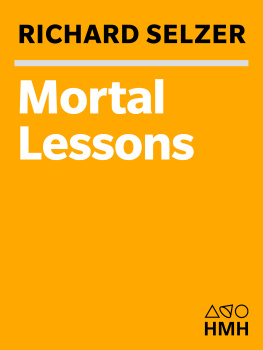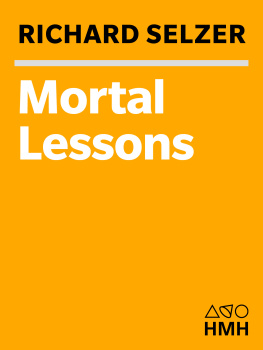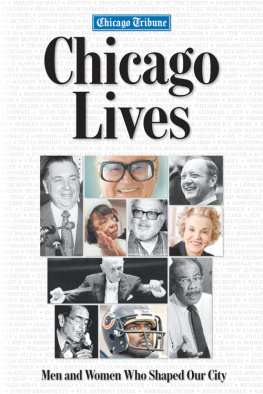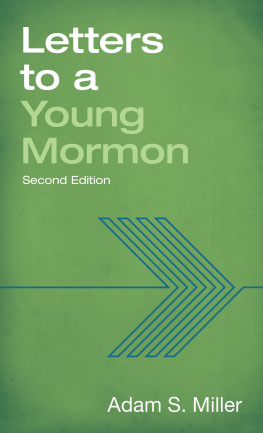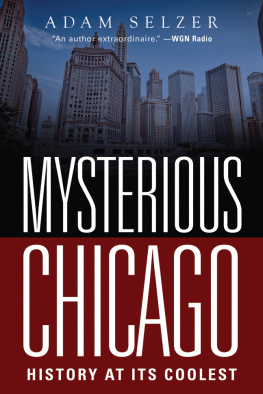Richard Selzer - Letters to a Young Doctor
Here you can read online Richard Selzer - Letters to a Young Doctor full text of the book (entire story) in english for free. Download pdf and epub, get meaning, cover and reviews about this ebook. year: 1996, publisher: Houghton Mifflin Harcourt, genre: Detective and thriller. Description of the work, (preface) as well as reviews are available. Best literature library LitArk.com created for fans of good reading and offers a wide selection of genres:
Romance novel
Science fiction
Adventure
Detective
Science
History
Home and family
Prose
Art
Politics
Computer
Non-fiction
Religion
Business
Children
Humor
Choose a favorite category and find really read worthwhile books. Enjoy immersion in the world of imagination, feel the emotions of the characters or learn something new for yourself, make an fascinating discovery.
- Book:Letters to a Young Doctor
- Author:
- Publisher:Houghton Mifflin Harcourt
- Genre:
- Year:1996
- Rating:4 / 5
- Favourites:Add to favourites
- Your mark:
- 80
- 1
- 2
- 3
- 4
- 5
Letters to a Young Doctor: summary, description and annotation
We offer to read an annotation, description, summary or preface (depends on what the author of the book "Letters to a Young Doctor" wrote himself). If you haven't found the necessary information about the book — write in the comments, we will try to find it.
Highly candid, insightful, and unexpectedly humorous essays on both the brutality and the beauty of the profession in which saving and losing lives is all in a days work. A timeless collection by the best of the writing surgeons (Chicago Tribune). With a Preface written by the Author especially for this edition.
Letters to a Young Doctor — read online for free the complete book (whole text) full work
Below is the text of the book, divided by pages. System saving the place of the last page read, allows you to conveniently read the book "Letters to a Young Doctor" online for free, without having to search again every time where you left off. Put a bookmark, and you can go to the page where you finished reading at any time.
Font size:
Interval:
Bookmark:
I N MEMORY OF MY FATHER ,
Julius Louis Selzer, M. D.
Preface copyright 1996 by Richard Selzer Copyright 1982 by David Goldman and Janet Selzer, Trustees
All rights reserved. No part of this publication may be reproduced or transmitted in any form or by any means, electronic or mechanical, including photocopy, recording, or any information storage and retrieval system, without permission in writing from the publisher.
For information about permission to reproduce selections from this book, write to Permissions, Houghton Mifflin Harcourt Publishing Company, 215 Park Avenue South, New York, New York 10003.
www.hmhbooks.com
Parts of this book appeared in The Atlantic, The New England Review, The Iowa Review, Self, and Anteus.
The author is grateful for permission to use an excerpt from Homer, The Odyssey, translated by Robert Fitzgerald. Copyright 1961 by Robert Fitzgerald. Reprinted by permission of Doubleday & Company, Inc.
The Library of Congress has cataloged the print edition as follows:
Selzer, Richard, 1928
Letters to a young doctor/by Richard Selzer.1st Harvest ed.
p. cm.(A Harvest book)
Originally published: New York: Simon & Schuster, cl982
ISBN 0-15-600399-6
1. Surgery. 2. Medicine. 3. Residents (Medicine). I. Title.
RD39.S437 1996
617dc20 95-53777
eISBN 978-0-547-54138-9
v1.0813
to the Harvest Edition (1996)
The title of this book was inspired by Rilkes Letters to a Young Poet. While these essays, memoirs, and stories are entirely lacking in the genius with which Rilkes Letters is infused, they were meant to be pedagogical and comradelya reaching out to share. There was also the impulse of the singer, the troubadour who strikes his lyre and chants. Singing is the reason he is alive. More than anything else, these writings strive to tell what it is like to be a doctor, to tend the sick, to be sick.
Rilke was right when he wrote that the events of the body lie outside the precincts of language. Pain, for one, cannot be described, nor can the extreme of physical ecstasy. In order to approach these events, I have roamed the imagination for metaphor, myth, and memory. These pieces are not, strictly speaking, factual in the way that a medical textbook is factual. Nor are they journalism or reportage. They are literary renditions of medicine meant to strike resonating chords in the readers mind. They are as much concerned with how something is said as they are with what is said. Style, here, is as important as content. Still, because I have spent a lifetime in medicine, there is much accurate detail. I have tried for anatomical and physiological fidelity but often without supplying a fixed meaning. I much prefer to invite interpretation.
I am grateful for the chance to see this work brought back into print. I cannot but see it as an act of affirmation. The real recognition has come from the generations of medical students and nurses who have read this book and written to tell me so. Not that there isnt a little melancholy in the sight of these many thousands of words that have fallen from my pen, filling sheet after sheet through multiple revisions such as to insist that I use paper the opposite side of which had been used before. (I never could justify the wastefulness that disdains half-used paper.) There is embarrassment as well. Writing may not be a crime, but it is always a lapse of taste. Mine anyway, which is explicit and shameless, a never-ending struggle between refinement and decadence, as one critic has commented.
This book was written in longhand, as is still my custom. It has to do with my inkwell, all that remains of an old Chinese inkstand. Black-and-red lacquered it was, and inlaid with mother-of-pearl. The lid of the inkwell is a bronze dragon that you pick up by the tail. Whenever you do, there is still the faint smell of sandalwood. A genie lives in this inkwell. Every time I fill my fountain pen, the scriptorium fills with aromatic smoke and he grants me three wishes. I usually ask for a metaphor or a bit of imagery. Unlike the genie in the Arabian Nights, mine is not a prisoner. He is enwelled in Paradise. Why not? All his wants are taken care of. Ink is for him nectar and ambrosia. His favorite brand is Higgins Eternal, which had long gone out of manufacture until I found the recipe in an old book. Now I concoct it for him myself. And clean? He is the cleanest genie in the world, leaves only a bit of sludge at the bottom, which I aspirate with a medicine dropper once a year. He loves his little airings whenever I ink up. And he loves me too. I know because once, and only once, he broke from his usual reticence and told me that he would not wish to remain intact for one minute after my death. He would rather, he said, diffuse. I was touched.
Each of these chapters is rooted in an event that I have experienced or witnessed. Imelda took place while on a surgical expedition to the Third World. The setting of Toenails was the New Haven Public Library, which I have been frequenting for forty years and where I still perform my humble acts of podiatry. Mercy was first remembered, then written at the Bellagio Study Center on Lake Como in Italy. The five Letters to a Young Surgeon are meant to be revelatory rather than instructive. Perhaps they serve to answer the question I have been asked so often: What is it like to lay open the body of a fellow human being? In Textbook, Rounds, and Semiprivate, Female, I strove to photograph the essential patient and to nail that snapshot to the page. Some few of these piecesthe meditation on a slug, The Grand Urinal of the Elks, and A Pint of Bloodwere meant to entertain my students and colleagues. I take full blame for any failure to do just that. The writing of Brute was an act of atonement written a quarter of a century after my having abused a patient, an abuse for which I have not forgiven myself to this day. Chatterbox was inspired by a woman whose affliction was her need to talk all the time. It was written in homage to St. Catherine of Siena, whose letters to her confessor, Fra Raimondo, are among the masterpieces of religious mysticism. Impostor was my attempt to use myth and fable to lay bare the heart of a doctor. There is more than a hint of autobiography in it. In this, I have followed the advice of Petronius that an artist ought to use allusion, myth, and symbol so that his work will be like the prophecy of an inspired seer rather than the sworn statement made under oath before witnesses.
Throughout this volume there is a strong note of spirituality. It would be hard to find a page that is without it. This is only natural for a writer who sees the flesh as the spirit thickened. Within the damaged or fragile body where brute and painful facts have gathered, there is always the possibility that we will come to a new understanding and to perceive the body as a primal mystery and therefore sacred. Again and again, in patients deformed or ravaged by disease, we are stunned by a sudden radiance. This is not always comforting; there is terror in occasions that lift the veil from the ordinary world. Over my desk there is a message written by John Donne: ...our blood labors to beget spirits. I believe I know what he meant.
I SEND AS YOUR GRADUATION PRESENT my fathers old textbook of physical diagnosis. It was published in 1918. Lifted yesterday from a trunk in the attic it is still faintly redolent of formaldehyde, and stained with Heaven only knows what ancient liquid. I love my old booksLongfellow, Virgil, Romeo and Juliet and Moby Dickbut I love this Textbook of Physical Diagnosis more. I can think of no better thing to give you as a reminder that all of Medicine is a continuum of which you are now a part. Within you is the gesture of the prehistoric surgeon who trephined his neighbors skull on the floor of a cave. Within you, the poultice of cool mud applied to a burn by an old African woman. The work of all doctors before you is in your blood. Yours will enter the veins of whosoever comes after you.
Next pageFont size:
Interval:
Bookmark:
Similar books «Letters to a Young Doctor»
Look at similar books to Letters to a Young Doctor. We have selected literature similar in name and meaning in the hope of providing readers with more options to find new, interesting, not yet read works.
Discussion, reviews of the book Letters to a Young Doctor and just readers' own opinions. Leave your comments, write what you think about the work, its meaning or the main characters. Specify what exactly you liked and what you didn't like, and why you think so.


